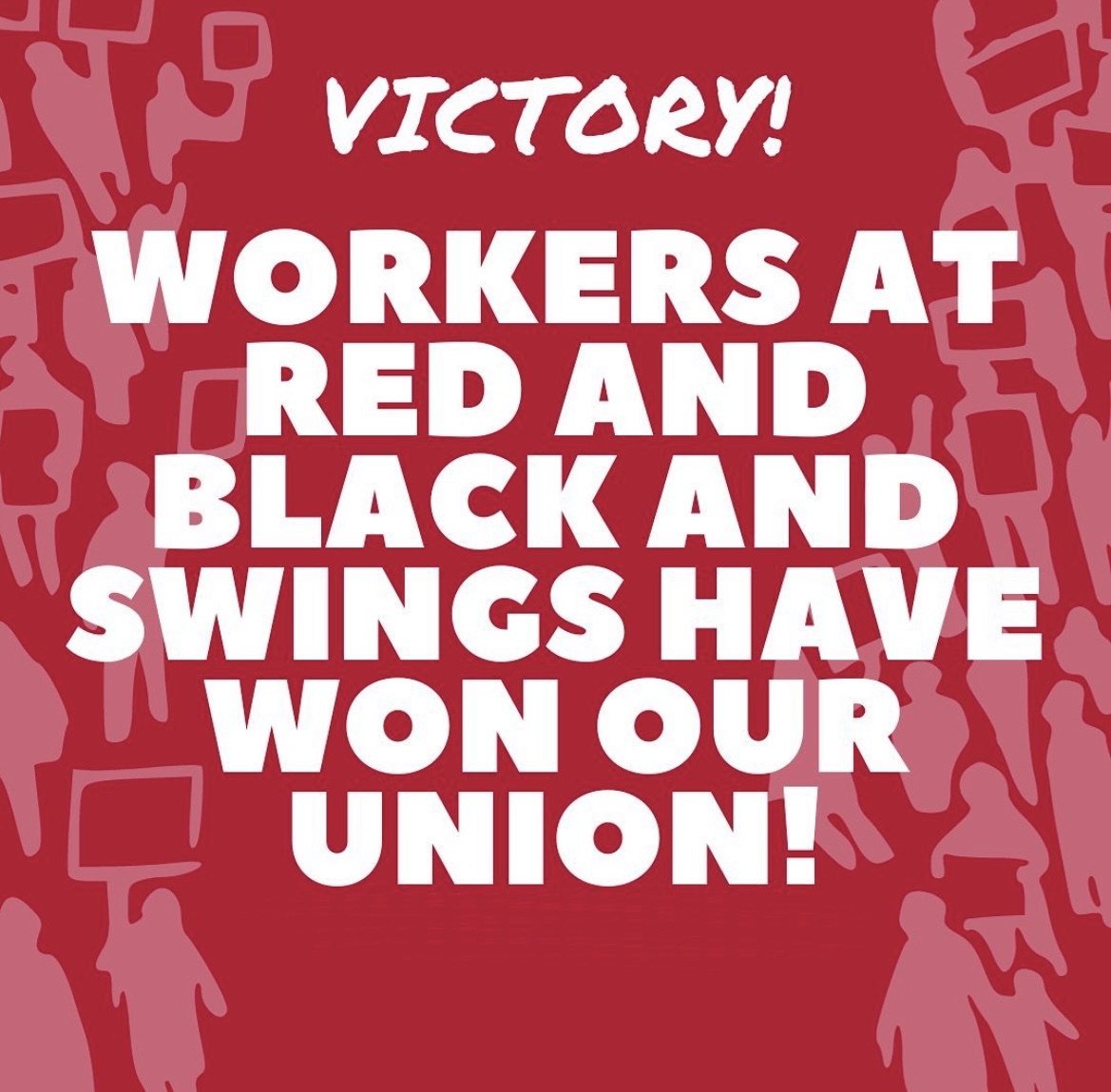
The management of Red & Black Cafe (RBC) and WesWings (Swings) voluntarily recognized a union for student and permanent employees in a statement released on Aug. 28, 2023, after an independent service certified union cards that were signed by employees and collected by UNITE HERE. The recognition came as a surprise to many after a contentious unionization campaign in the spring.
At the end of the 2022–23 academic year, voluntary recognition was not on the table. After negotiations, an election to decide the fate of the union was set for September. Several workers and management perceived emotional stress at the workplace to be high and the unionization process to be unfair. It was unclear what direction the election would take until the owners of RBC and Swings, Karen Polascik and Edward Thorndike ’89, released their statement voluntarily recognizing the union.
Although the legal team of the union had been in contact in order to plan the voluntary recognition, other members of the union expressed surprise and delight over the decision.
“I was super surprised,” Eva Weintraub ’24, a union member who was involved in summer organizing, said. “Honestly, it took me a while to process when I got that call from Hannah [Schmitt], the organizer.”
It is unclear whether the decision to voluntarily recognize the union came as a result of union organizing efforts or as a result of general deliberations conducted by the management of RBC and Swings over the summer.
“We needed time to learn about the process and ensure that ALL employees had the opportunity to understand the full implications,” Thorndike wrote in an email to The Argus. “The events of last semester were incredibly divisive to our staff and created a considerable amount of emotional stress on everyone. We felt it was in the best interests of everyone involved to not start the semester the way the last semester ended.”
During the spring semester, union organizers had called for the University to step in and support a recognition of the union. However, according to Thorndike, the management of RBC and Swings was not in contact with the University over the summer except to notify them of the recognition.
The union was engaged in several organizing activities over the summer, which Weintraub described as integral to the initiative. The efforts involved student workers who had stayed on campus, full-time employees of RBC and Swings, and Bon Appétit Management Company summer workers. (Bon Appétit runs all other campus dining services, including Usdan Marketplace and Summerfields.)
In addition, University labor organizers attended a town hall-style meeting on July 24, 2023, with U.S. Representative Rosa DeLauro, who represents Middletown, and other labor leaders and politicians from Connecticut. They discussed the unionization efforts and share stories about organizing in the state.
“That was really cool, to hear about the state of unionizing across Connecticut, and [DeLauro] was super supportive of our campaign, as were the other people in the room,” Weintraub said.
Several union members emphasized the importance of continued conversation with both student and permanent employees. Some of these conversations were home visits, although The Argus was not able to verify how exactly all of the conversations were conducted.
“The main focus was, of course, just continuing to deepen our relationships with our coworkers,” Weintraub said. “I think that was my main concern over the summer. Because those are the people who really matter when it comes to an election.”
Some workers highlighted that conversations conducted outside the workplace were very different from those conducted at the workplace.
“Obviously, people will feel more comfortable talking about their job outside of Red and Black or something, especially since those places were closed for the summer,” Alec Black ’23, who was involved in union organizing during the spring, said. “And we wanted to continue those conversations.”
Now that the union has been recognized, a new contract will be negotiated. What exactly the bargaining process will look like was not clear from the interviews, but the most immediate steps are for the union to organize dates and choose a bargaining committee.
“We believe working with everyone, we can transform our operations to improve the lives of our employees, the experience of our customers and the overall dining plan at Wesleyan,” Polascik and Thorndike wrote in their original recognition statement.
No specific issues have been decided on for the bargaining process, but union members expressed a variety of improvements that they would like to see.
“Definitely…higher wages for everyone,” Weintraub said. “This is obvious. Better benefits and health care for our non-student workers, I think, is huge. I think students are really interested in having a free meal shift.”
Overall, both union members and management expressed optimism going forward. Some workers cited being able to avoid an election as a major win in the process of unionization and negotiating a new contract.
“I’m really thrilled that they decided to recognize because an election would have been a pretty arduous process for everyone involved,” Black said. “Especially because a lot of people who have graduated would have not been able to vote, because of location and things like that, and a lot of new hires would not have been able to vote.”
Leo Bader can be reached at lbader@wesleyan.edu.


Leave a Reply